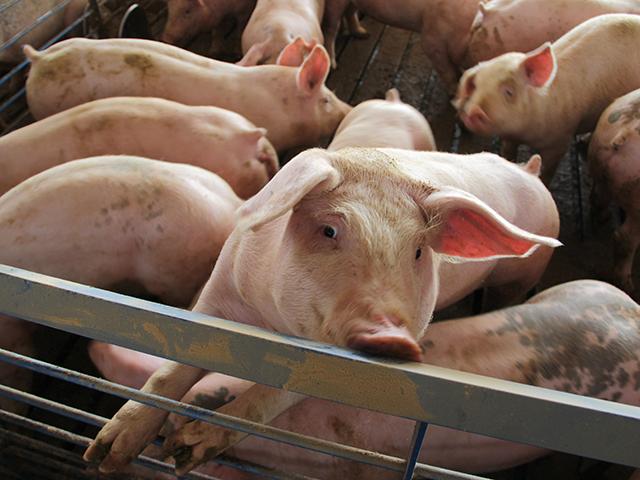Commerce Clause on Center Stage
20 States, Industry Groups Join Appeal Against California's Proposition 12
OMAHA (DTN) -- Twenty states joined the National Pork Producers Council and the American Farm Bureau Federation in an attempt to stop the state of California from implementing Proposition 12. The case is in the U.S. Court of Appeals for the Ninth Circuit in San Francisco.
The ag groups had their case dismissed in the U.S. District Court for the Southern District of California in April. The groups asked the court to decide whether the state can enforce Proposition 12 against farmers in other states.
The law requires hog producers to abide by certain regulations in order to sell pork in California. Voters in the state passed Proposition 12 in 2018 with nearly 63% of votes supporting it.
The ag groups have been joined in the lawsuit by the states of Indiana, Alabama, Alaska, Arkansas, Georgia, Iowa, Kansas, Louisiana, Missouri, Montana, Nebraska, North Dakota, Ohio, Oklahoma, South Carolina, South Dakota, Texas, Utah, West Virginia and Wyoming.
In an amicus brief filed with the court, the states argue Proposition 12 is unconstitutional and violates the Commerce Clause.
"It prohibits the sale of any veal, pork, or eggs produced from animals not raised in accordance with California rules, regardless of where those animals were raised," the states argue.
"Worse, California has proposed regulations that would permit California officials to conduct on-site inspections in other states and would impose onerous record-keeping requirements on out-of-state farmers. California's rules are a substantial departure from current practices in most states, including amici states. The Commerce Clause does not permit California to upset those practices by setting a single, nationwide animal-confinement policy."
The states point to two Supreme Court rulings holding that courts are required to consider the practical effects of a state law when dealing with the Commerce Clause.
P[L1] D[0x0] M[300x250] OOP[F] ADUNIT[] T[]
In this case, the ag groups have argued the practical effect of Proposition 12 is to regulate ag producers in other states.
"The district court also read this court's decisions to say that extra-territoriality analysis under the Commerce Clause should ignore the law's practical effects," the states said in their brief.
"Yet this runs directly contrary to the Supreme Court's decisions in Healy and Carbone. As noted, both decisions specifically held that courts considering extraterritoriality challenges must consider the law's 'practical effect.'"
In C&A Carbone v. Town of Clarkstown, the Supreme Court held an ordinance requiring all local solid waste to be processed at a local transfer station violated the Commerce Clause because it deprived out-of-state competitors access to a market.
In Healy v. Beer Institute, the Supreme Court said, "Any attempt directly to assert extraterritorial jurisdiction over persons or property would offend sister states and exceed the inherent limits of the state's power."
Several industry groups also have joined the ag groups in their appeal, including the National Association of Manufacturers, the Chamber of Commerce of the United States of America, FMI -- The Food Industry Association, the National Cattlemen's Beef Association and the National Mining Association.
In an amicus brief filed with the court, these groups also allege Proposition 12 violates the Commerce Clause.
"Amici have a strong interest in this case because Proposition 12 regulates the conduct of farmers, processors, wholesalers, and retailers nationwide," the brief said.
"In addition, Proposition 12, if allowed to stand, may embolden other states to regulate beyond their borders, resulting in a complex web of inconsistent and competing extraterritorial regulations in the agriculture and food industries, and beyond. Fragmenting these interstate markets will create inefficiencies and could impose significant costs on industry and consumers."
As of Jan. 1, 2022, Proposition 12 prohibits the sale of pork not produced, according to California's production standards. Proposition 12 applies to any uncooked pork sold in the state, regardless of whether it was raised in California.
In the original lawsuit filed on Dec. 6, 2019, the agriculture groups asked the court to declare the law unconstitutional in violation of the Commerce Clause.
The law forbids the sale of whole pork meat in California from hogs born of sows not housed in conformity with the law. Proposition 12 forbids sows from being confined in such a way that they cannot lie down, stand up, fully extend their limbs, or turn around without touching the sides of their stalls or other animals.
In its April ruling, the district court rejected the plaintiffs' allegation the state is regulating commerce in other states.
The original lawsuit was backed by attorneys general in Indiana, Iowa, Kansas, Missouri, Nebraska, Alabama, Arkansas, Louisiana, Oklahoma, Ohio, South Carolina, South Dakota, Texas, Utah and West Virginia.
According to the National Pork Producers Council, less than 1% of pork produced in the United States meets Proposition 12 requirements.
The state needs about 700,000 sows to satisfy its pork demand. About 1,500 out of California's 8,000 sows are used in commercial breeding housed in small farms. The NPPC has argued because the state has to import most of its sows, Proposition 12 essentially regulates farmers beyond state borders.
Todd Neeley can be reached at todd.neeley@dtn.com
Follow him on Twitter @toddneeleyDTN
(c) Copyright 2020 DTN, LLC. All rights reserved.




